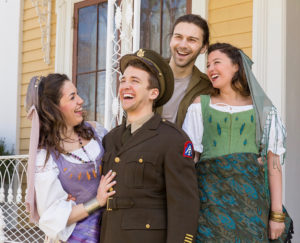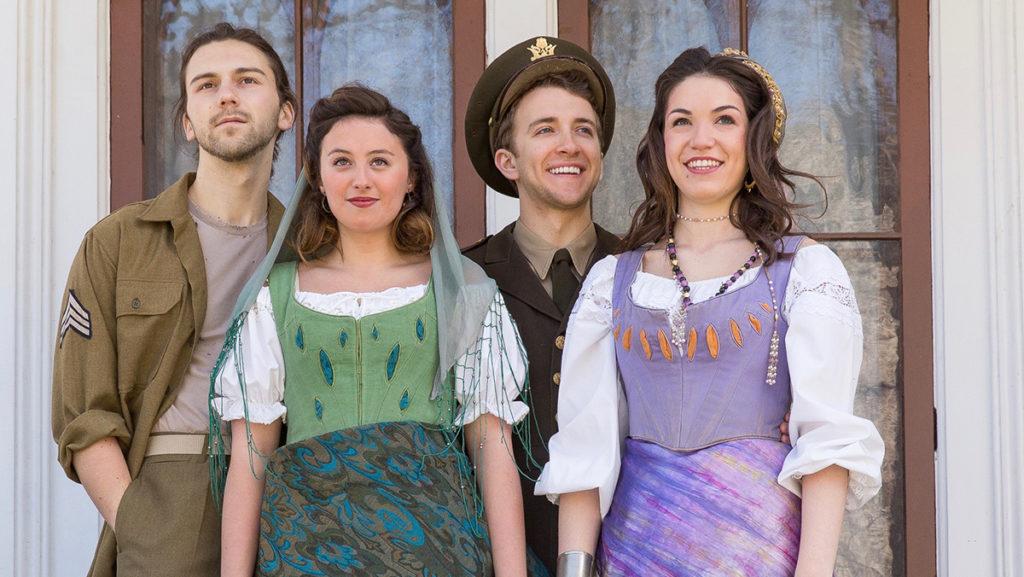The lights are bright. The night is young. The drinks flow freely. There’s an energy in the air, a sense of freedom, tension and passion. The war is over, America won, the time for restraint has passed.
“The Rover” is the final main stage production from the Ithaca College theater department for the 2016–17 season. It is an updated version of the sexually charged 1677 play written by Aphra Behn, an English woman who was the first woman to make a living from her writing. Behn was successful enough to support her husband, an act which bucked the gender roles of the time.
Behn’s play tells the story of Hellena, played by junior Keely Bochicchio-Sipos, and Florinda, played by junior Andrea D’Arco, two sisters determined to find love. Amid the drama is an exploration of gender roles and the challenges and paradoxes of love. “The Rover” contains controversial depictions of prostitution and rape that were slightly modified in the new version of the script. Despite the heavy social commentary, the play is a comedy, even in its original form.
The official opening was at 8 p.m. April 25 in the Hoerner Theatre in Dillingham Center. It will also be performed April 27, 28, 29 and 30.
Director Greg Bostwick, professor in the Department of Theater Arts, decided to update the setting and period of the production from the original 17th-century Naples carnival to World War II New Orleans during Mardi Gras. Despite the change in location, most of the linguistic style was preserved. Senior Olivia Ohlsten, stage manager of “The Rover,” said she embraced the challenge of interpreting a difficult text.
“Sometimes, it’s been weird because it’s relatively modern but the language isn’t,” Ohlsten said. “So we changed a couple of words … but I think it’s a good exercise for all of us in the process to work on a show that’s in a language so different from what we speak.”
Assistant director junior Jacqueline Asbury said she fell in love with the play when she first read it in one of her classes.
“We actually had to read it in theater history my sophomore year, and I absolutely loved it,” Asbury said. “I thought it was hysterical. … And then they announced it would be part of the season for this year, and as soon as they said that they were doing ‘The Rover,’ I said, ‘I want to be in that show.’ So I sent in my application for the assistant director position … and we started the process, and it’s been a rollercoaster ever since.”
The updated show features several design and performance embellishments, including a rotating stage and a number of choreographed fight scenes. To ensure the clashes between characters are believable and safe, the production team hired Michael Jerome Johnson, a fight director of the Society of American Fight Directors, to choreograph fights for “The Rover.” His credits include fight directing for “Constant Star,” “A Streetcar Named Desire” and other productions.

Asbury said they chose to modernize their production through both language and setting to infuse an energy into the show that may have been otherwise absent.
“The director wanted to get the feel of a party environment where people are finally able to let loose when they weren’t able to for a long time,” Asbury said. “The closest thing to that in America was Mardi Gras, post–World War II, because Mardi Gras during the war was very low-key because of a lack of resources and because all the soldiers were overseas, so after the war ended — that was the first Mardi Gras that could be super crazy and fun again.”
Ohlsten said that despite the humor and energy of the play, both the original text and the revised version of “The Rover” were challenging because they touched on challenging topics in an archaic way. She said the cast came together to work through the complexities of the play and create a cohesive performance.
“The show has some difficult subjects, like rape, that have been difficult for the cast and design team and everyone to grapple with, considering we don’t share the same opinions and we don’t believe the original script does justice in this time period,” Ohlsten said. “So we did a lot of discussion with the cast. We’re doing this show. … We’re working with it, but it can be difficult when we don’t agree with all the themes.”
Asbury said both the new and original versions “The Rover” aren’t completely outdated. She said she found the portrayal of political issues and gender relationships relevant to modern situations.
“It’s so important to see how plays this old translate to our current climate and how things are still so relevant 350 years later and are still relevant in the ’40s as we’re portraying it,” Asbury said. “There are still men out there who think women owe them things and women who don’t have the agency to fight back and don’t know how. So I think it’s important to recognize that as much as humanity has changed, we still have a very long way to go.”
Senior Stella Bowles, the dramaturge for the show, is tasked with preserving the original intentions of the playwright and ensuring the audience understands what happens on stage. Bowles said the update was significant because it gives the show a socially progressive angle, but she found it challenging to adapt a show with outdated gender politics.
“It’s a very difficult play because it deals with really sensitive topics, and it was really important that Aphra then put those topics on the stage in 1667,” Bowles said. “But from our modern mindset, it’s a little bit difficult to see women being belittled and attacked a little bit in this way, especially with the lives of prostitutes who were seen as disgusting and just kind of there as the male enjoyment. So I think kind of tackling those dark moments in the play, but also realizing it’s a comedy that’s supposed to be laughed at, and how do we kind of reconcile the two now?”
Asbury said that despite the narrative complexity and the difficult political subject matter of “The Rover,” it is still worth seeing.
“At its core, this play is about people,” Asbury said. “So if you stick with the characters and just really invest yourself in their journey, you’re going to have a good time.”
Tickets are $10 and are available online at ithaca.ticketforce.com.








